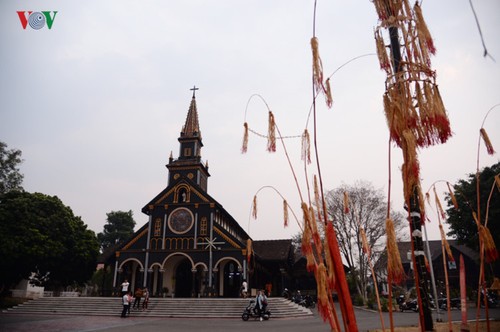 The Kon Tum Church in Vietnam's Central Highlands (Photo: My Tra) The Kon Tum Church in Vietnam's Central Highlands (Photo: My Tra) |
The Party and State have fine-tuned laws and policies to better protect citizens’ freedom of belief and religion.
Political system’s responsibility for uniting religions
Most Venerable Thich Thien Tam, Vice Chairman of the Vietnam Buddhist Sangha Executive Council, commented on the Politburo’s project: “Because all religions are members of the Vietnam Fatherland Front, they are able to jointly take part in national construction and defense. The Party, State, and mass organizations like the Vietnam Fatherland Front play an important role in the development of religions. The authorities have worked to restore religious facilities, especially in remote and disadvantaged regions.”
Mobilizing and uniting religions should match the new trend of national solidarity, democracy, and consensus. Le Truyen, a member of the Presidium of the Vietnam Fatherland Front Central Committee, said that communication between the administration and religious dignitaries is an effective way to bridge religious differences: “Sincere communication is part of our effort to unite religions. This method only works when there is sincerity, meaning mutual respect and understanding.”
Fatherland Front, a core force to unite religions
The Politburo’s project spells out the task of religious mobilization and unity at all administrative levels and awareness on the part of all personnel of the importance of this task. The project draft underscores the need to promote the political system’s role and responsibility in undertaking the task, particularly in areas, where religious followers make up a majority of the population. In this project, the Vietnam Fatherland Front will be a core force in mobilizing religions. Nguyen Quoc Tuan, former Director of the Institute for Religion Study at the Vietnam Academy of Social Sciences, said: “The Front must be a mediator of religions. That’s what is desperately needed. The Front should also mediate between religious and non-religious people. All this should be done in an objective manner in order to create solidarity and unity.”
The Politburo draft makes it clear that uniting religions is essential to mobilizing religious resources for national construction and defense.